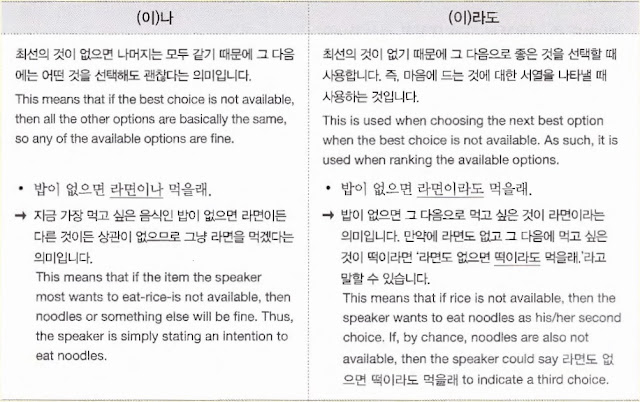가: 남편이 선물을 자주 해요?
Does your husband buy you a lot of gifts?
나: 아니요, 결혼하고 한 번도 선물을 받아 본 적이 없어서 장미꽃 한 송이라도 받아 보면 좋겠어요.
No. I haven’t received a single gift since we got married. It would be nice to get even a rose sometime.
가: 무슨 일인데 아침부터 전화를 했니?
What brings you to call me in the morning?
나: 처리해야 할급한 일이 생겼는데 직원들이 모두 못 나온대. 그러니까 너라도 와서 좀 도와줘.
An urgent matter came up, but none of the employees could come in. So I want (even) you to come in and help out.
The expression ‘(이)라도’ is used to indicate the speaker’s choice of something that will suffice even though it is not the best option among the available choices. It can be used in combination with a number of particles, such as in 만이라도, 부터라도, (으)로라도, 에게/한테라도, 에라도, 에서라도, and 하고라도.
 • 집이 너무 멀어서 중고차라도 한 대 사아겠어요.
• 집이 너무 멀어서 중고차라도 한 대 사아겠어요.
My house is so far away I think I’ll have to buy a used car (or something).
• 그렇게 쉬지 않고 일만 하면 어떻게 해요? 여기 앉아서 잠깐이라도 좀 쉬세요.
How can you work all the time and never take a rest? Please have a seat here and rest (even for) a little while.
• 열심히 공부한다고 해 놓고 오늘도 놀아 버렸어요. 내일부터라도 열심히 해야겠어요.
I said I was going to study hard, but I played around again today. I’ll have to work hard from tomorrow.
When (이)라도 is used together with 어느,아무,무엇,무슨, or 누구, the expression means that something is the case no matter the circumstances or situation.
• 어느 곳이라도 사랑하는 사람과 함께 있을 수 있다면 저는 상관이 없어요.
If I can be together with the person I love, then the location doesn’t matter.
• 아무 말이라도 좋으니까 제발 대답 좀 해 보세요.
It doesn’t matter what you say, I’m begging you to please respond.
• 영수 씨는 무슨 일이라도 할 수 있는 사람이에요. 그러니까 믿고 맡겨 보세요.
Yeongsu is someone who can do any job no matter what That’s why you should trust him (with this job),
• 누구라도 연락이 먼저 되는 사람에게 이야기를 하려고 합니다.
I intend to talk to whoever I reach first. It doesn’t matter who (that person is).
The examples above mean “no matter what place”, “no matter what one says”, “no matter what the task”, and “no matter who”, respectively, and thus they all basically mean “the same (result) regardless of …”
The expressions (이)나 and (이)라도, both used for expressing a choice, are different in the following respects.

>> You can click on the title of each grammar below to learn about the other grammar which also expresses ‘Choice’:
01 아무 + (이)나/아무 + 도
02 (이)나
03 (이)라도
04 -든지 -든지
05 -(으)ㄴ/는 대신에
>> Full of Intermediate grammar: Click here

